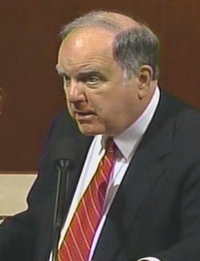Quote of the day: While waiting for apologies, Paul Krugman asks why we should pay any attention to the dim bulbs who mocked Iraq-war "Cassandras"
>
 Unhappy Cassandra all too correctly foresees catastrophe for the Trojans in this drawing for the Salzburg Festival's first-ever production (in 2000) of Hector Berlioz' epic opera Les Troyens.
Unhappy Cassandra all too correctly foresees catastrophe for the Trojans in this drawing for the Salzburg Festival's first-ever production (in 2000) of Hector Berlioz' epic opera Les Troyens."The New Republic now says that it 'deeply regrets its early support for this war.' Does it also deeply regret accusing those who opposed rushing into war of 'abject pacifism'?"
--Paul Krugman, in his NYT column today, "They Told You So"
But Krugman's real point isn't "We told you so." (He's too modest to quote himself anyway.) By now I think we're all learning the trick of waiting for those iron-fist column clinchers. After reminding the imbecilic sociopaths at The Weekly Standard, the geniuses who invoked Cassandra, that the whole point about her story is that her warnings all came true, then running through some of the questions raised by the ignored or derided Iraq-war "Cassandras," he lands the body blow:
We should honor these people for their wisdom and courage. We should also ask why anyone who didn't raise questions about the war--or, at any rate, anyone who acted as a cheerleader for this march of folly--should be taken seriously when he or she talks about matters of national security.
Hmm.
December 8, 2006
Op-Ed Columnist
They Told You So
By PAUL KRUGMAN
 Shortly after U.S. forces marched into Baghdad in 2003, The Weekly Standard published a jeering article titled, "The Cassandra Chronicles: The stupidity of the antiwar doomsayers." Among those the article mocked was a "war novelist" named James Webb [right], who is now the senator-elect from Virginia.
Shortly after U.S. forces marched into Baghdad in 2003, The Weekly Standard published a jeering article titled, "The Cassandra Chronicles: The stupidity of the antiwar doomsayers." Among those the article mocked was a "war novelist" named James Webb [right], who is now the senator-elect from Virginia.The article's title was more revealing than its authors knew. People forget the nature of Cassandra's curse: although nobody would believe her, all her prophecies came true.
And so it was with those who warned against invading Iraq. At best, they were ignored. A recent article in The Washington Post ruefully conceded that the paper's account of the debate in the House of Representatives over the resolution authorizing the Iraq war--a resolution opposed by a majority of the Democrats--gave no coverage at all to those antiwar arguments that now seem prescient.
At worst, those who were skeptical about the case for war had their patriotism and/or their sanity questioned. The New Republic now says that it "deeply regrets its early support for this war." Does it also deeply regret accusing those who opposed rushing into war of "abject pacifism?"
Now, only a few neocon dead-enders still believe that this war was anything but a vast exercise in folly. And those who braved political pressure and ridicule to oppose what Al Gore has rightly called "the worst strategic mistake in the history of the United States" deserve some credit.
Unlike The Weekly Standard, which singled out those it thought had been proved wrong, I'd like to offer some praise to those who got it right. Here's a partial honor roll:
Former President George H. W. Bush and Brent Scowcroft, explaining in 1998 why they didn't go on to Baghdad in 1991: "Had we gone the invasion route, the United States could conceivably still be an occupying power in a bitterly hostile land."
 Representative Ike Skelton [left], September 2002: "I have no doubt that our military would decisively defeat Iraq's forces and remove Saddam. But like the proverbial dog chasing the car down the road, we must consider what we would do after we caught it."
Representative Ike Skelton [left], September 2002: "I have no doubt that our military would decisively defeat Iraq's forces and remove Saddam. But like the proverbial dog chasing the car down the road, we must consider what we would do after we caught it."Al Gore, September 2002: "I am deeply concerned that the course of action that we are presently embarking upon with respect to Iraq has the potential to seriously damage our ability to win the war against terrorism and to weaken our ability to lead the world in this new century."
Barack Obama, now a United States senator, September 2002: "I don't oppose all wars. What I am opposed to is a dumb war. What I am opposed to is a rash war. What I am opposed to is the cynical attempt by Richard Perle and Paul Wolfowitz and other armchair, weekend warriors in this administration to shove their own ideological agendas down our throats, irrespective of the costs in lives lost and in hardships borne."
 Representative John Spratt [right], October 2002: "The outcome after the conflict is actually going to be the hardest part, and it is far less certain."
Representative John Spratt [right], October 2002: "The outcome after the conflict is actually going to be the hardest part, and it is far less certain."Representative Nancy Pelosi, now the House speaker-elect, October 2002: "When we go in, the occupation, which is now being called the liberation, could be interminable and the amount of money it costs could be unlimited."
Senator Russ Feingold, October 2002: "I am increasingly troubled by the seemingly shifting justifications for an invasion at this time. . . . When the administration moves back and forth from one argument to another, I think it undercuts the credibility of the case and the belief in its urgency. I believe that this practice of shifting justifications has much to do with the troubling phenomenon of many Americans questioning the administration's motives."
 Howard Dean [right], then a candidate for president and now the chairman of the Democratic National Committee, February 2003: "I firmly believe that the president is focusing our diplomats, our military, our intelligence agencies, and even our people on the wrong war, at the wrong time. . . . Iraq is a divided country, with Sunni, Shia and Kurdish factions that share both bitter rivalries and access to large quantities of arms."
Howard Dean [right], then a candidate for president and now the chairman of the Democratic National Committee, February 2003: "I firmly believe that the president is focusing our diplomats, our military, our intelligence agencies, and even our people on the wrong war, at the wrong time. . . . Iraq is a divided country, with Sunni, Shia and Kurdish factions that share both bitter rivalries and access to large quantities of arms."We should honor these people for their wisdom and courage. We should also ask why anyone who didn't raise questions about the war--or, at any rate, anyone who acted as a cheerleader for this march of folly--should be taken seriously when he or she talks about matters of national security.
A SOUPCON OF CULTURE WOULDN'T KILL YOU, GUYS
And you know, it might not have hurt the buffoons at The Weekly Standard if they weren't such self-glorying cultural ignoramuses. (And not just those buffoons. We've reached a time when Americans not only aren't ashamed of being cultural ignoramuses but seem actually proud of it.)
After all, the story of Cassandra is hardly an obscure part of our heritage. In particular, to anyone who knows Berlioz' awe-inspiring opera, there is no more overpowering moment in the theatrical literature than the climax of the "Trojan" section. Troy has been devastated, most of the Trojan men who refused to listen to Cassandra's warnings are dead, and the small band of survivors led by Aeneas is en route to Carthage (which they will also wind up abandoning to its fate). It's Cassandra who's left to lead the surviving Trojan women, faced with likely rape by the marauding Greek conquerors, singing resolutely to their deaths.



0 Comments:
Post a Comment
<< Home